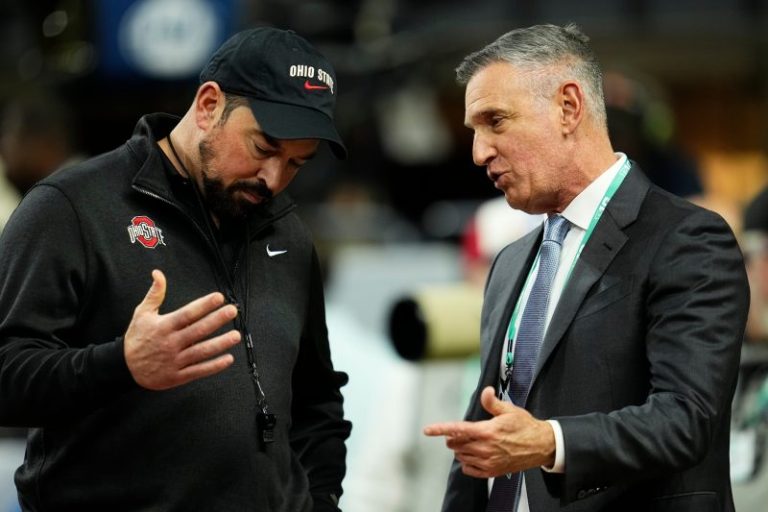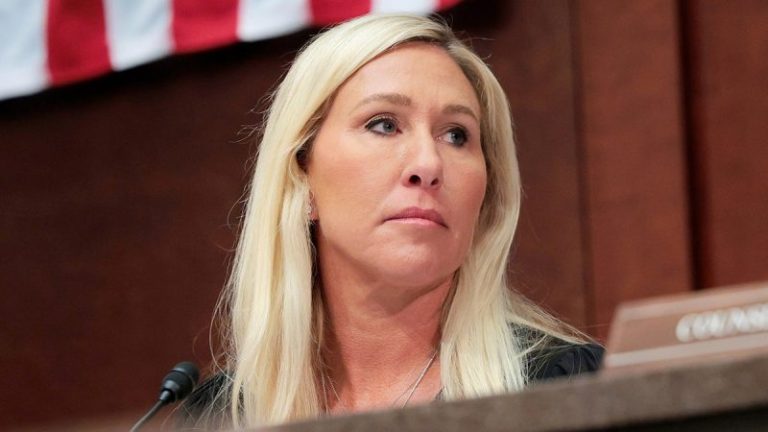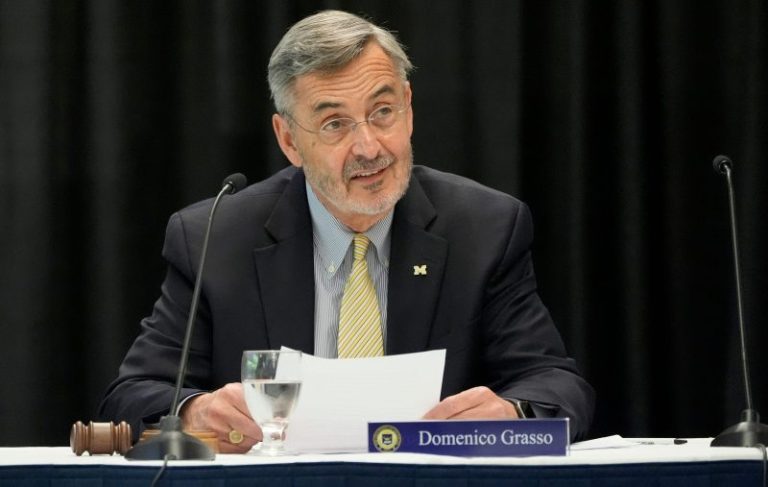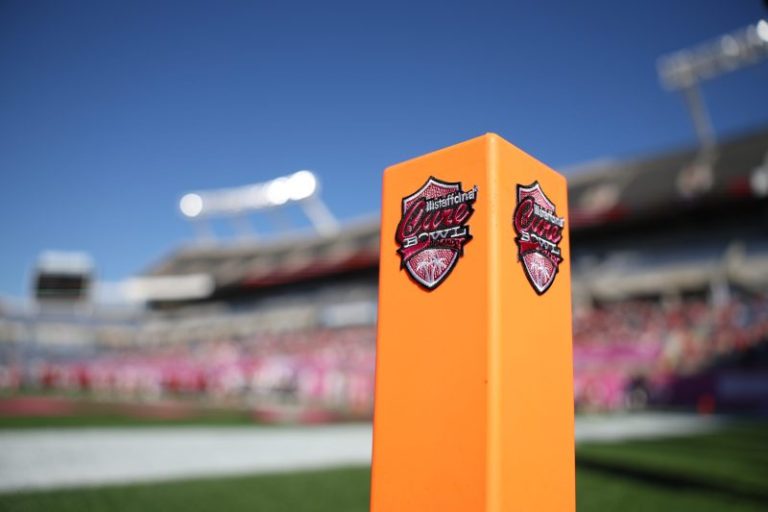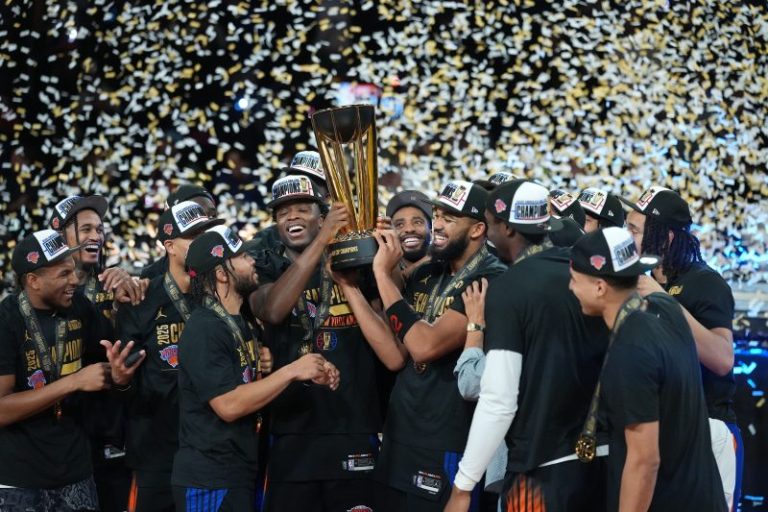Behind a 100-yard rushing performance from quarterback Quinn Henicle and a five-turnover performance from its defense, the Monarchs defeated South Florida 24-10 in the Cure Bowl at Camping World Stadium in Orlando, Florida, on Wednesday, Dec. 17.
In just his second career start, Henicle struggled as a passer, going 11-of-25 for 127 yards, but dominated on the ground with 24 rushes for 107 yards and two touchdowns. He picked up a 51-yard touchdown with just over two minutes remaining to ice the 10th win of the season for ODU.
Henicle earned the start after starting quarterback Colton Joseph announced his intention to transfer.
USF, without its own starting quarterback, Byrum Brown, and head coach Alex Golesh ― who is headed to Auburn ― struggled to run the ball and turned the ball over five times against the Old Dominion defense.
The Bulls finished with 35 rushes for 52 yards, averaging just 1.5 yards per carry, with a long run of 12 yards. They also turned the ball over five times, including throwing four interceptions and losing a fumble.
Gaston Moore was forced from the game in the fourth quarter after he hit his head on the turf. He did not return, which meant true freshman Locklan Hewlett was thrown into the fire. Moore finished 20-of-28 passing for 236 yards, one touchdown and two interceptions, while Hewlett was 7-of-12 passing for 45 yards and an interception.
Two of the three losses for ODU this season came against teams in the College Football Playoff field ― Indiana and James Madison.
South Florida held a 10-7 halftime lead, but was outscored 17-0 in the second half.
USA TODAY Sports brought you live updates, scores and highlights from the game. Check it out.
Old Dominion vs South Florida score
Old Dominion vs South Florida highlights
Old Dominion-South Florida score: Monarchs 24, Bulls 10 (Final)
Old Dominion-South Florida final stats
Daevon Iles picks off Locklan Hewlett
Daevon Iles picks off a pass near the end zone from Locklan Hewlett and that should do it. It’s the fifth turnover of the game for the Bulls, which led to seven points for the Monarchs.
Quinn Henicle scores a 51-yard touchdown
Quinn Henicle takes a QB keeper and goes 51 yards for a touchdown to extend the Old Dominion lead to 24-10 with 2:24 left in the game.
Henicle has 107 yards and two rushing touchdowns on 24 attempts. He had a 16-yard run on third-and-5, which helped take more time off the clock one play earlier.
The scoring drive is four plays for 57 yards and takes 1:15 off the game clock.
USF fake punt pass intercepted
Trailing by seven points and time winding down, USF attempts a fake punt, but Jerome Carter picks off a pass from Chase Leon. The Monarchs take over from their own 28-yard line following an unsportsmanlike conduct penalty.
Nathanial Eichner misses field goal wide left
Old Dominion misses a chance at a nail in the coffin with Eichner missing a 36-yard field goal. The score remains 17-10 with 5:54 left in the game. The Bulls will take over on their own 18-yard line.
Christian Neptune muffs punt
Christian Neptune muffs a punt that goes off a teammate’s arm from Old Dominion, with USF is about to get the ball back with a chance to tie it. Old Dominion will take over on the Bulls’ 38-yard line with a chance to extend the lead.
Locklan Hewlett in for Gaston Moore
Freshman Locklan Hewlett is in with Gaston Moore out of the game. He is a true freshman and the third-string QB for USF.
Gaston Moore down following long pass to JeyQuan Smith
Gaston Moore is down on the field with the USF medical staff examining him after he completes a pass to Jeyquan Smith. Moore was hit late by an ODU defender and appeared to hit his head on the turf.
His offensive line immediately motioned for the medical team to come out. Moore walked off the field under his own power.
End of third quarter: Old Dominion 17, South Florida 10
Old Dominion holds a 17-10 lead over USF through three quarters in the Cure Bowl. The Bulls will face a fourth-and-5 from the ODU 39-yard line when the fourth quarter commences.
Nathanial Eichner field goal extends ODU lead
Eichner hits a 24-yard field goal to extend the Old Dominion lead to 17-10 with 3:27 left in the third quarter.
The scoring drive is 10 plays for 73 yards and takes 4:13 off the game clock.
De’Shawn Rucker ejected for targeting
De’Shawn Rucker is ejected for targeting on his hit on Quinn Henicle, which keeps the ball with Old Dominion at the USF 9-yard line.
Henicle remains in the game.
Quinn Henicle loses fumble, hurt on rushing attempt
Quinn Henicle loses a fumble following a 12-yard rush. He was hit on the play and is down on the field with an injury.
However, the play is under review for targeting.
Nico Gramatica misses second field goal
Nico Gramatica misses his second field goal of the game, with this coming from 39 yards out. The kick is missed wide left. Gramatica also missed a kick from 48 yards out earlier in the game. He made a 28-yard field goal in the first quarter.
Gramatica entered the game 17-of-21 on his kicks this season.
Trequan Jones gives Old Dominion lead
Facing a third-and-7, running back Trequan Jones finds a big hole after cutting and takes it 22 yards to give Old Dominion a 14-10 lead with 10:06 left in the third quarter.
The scoring drive is three plays for 25 yards and takes 38 seconds off the clock, coming off the interception from Jerome Carter.
Jerome Carter intercepts Gaston Moore
Gaston Moore throws inaccurately and safety Jerome Carter intercepts his pass. Carter returns the interception for 26 yards to the USF 25-yard line.
Old Dominion begins second half of Cure Bowl on offense
After deterring the decision to possess the ball on the coin toss, Old Dominion will begin the second half on offense. The Monarchs trail South Florida 10-7 after one half of play.
Halftime: South Florida 10, Old Dominion 7
Old Dominion-South Florida halftime stats
Old Dominion turns ball over on botched snap on field goal
Ian Brandt cannot handle the snap on a field goal attempt that would have tied the game at 10-10 at the end of the first half. Instead, Old Dominion does not score and the game will be 10-7 at halftime.
That stalls a drive that went 14 plays for 56 yards and gave the Monarchs the chance to take the lead or tie the game going into halftime.
Earlier in the drive, Quinn Henicle missed a wide-open tight end in the end zone that would have given Old Dominion the lead.
Brandon Crutchfield picks off Gaston Moore
With USF driving, Gaston Moore sails a pass, and it is picked off by Old Dominion’s Brandon Crutchfield with 3:23 left in the first half. The Monarchs begin the drive from their own 20 following an 11-yard return.
Jeremiah Koger TD catch gives USF lead
Gaston Moore hits freshman receiver Jeremiah Koger for a 31-yard touchdown to give USF a 10-7 lead with 7:24 left in the first half. Moore connected with Koger for a 25-yard play on the play before the touchdown.
The scoring drive is three plays for 55 yards and takes 1:03 off the game clock.
Koger has three receptions for 62 yards and the score, while Moore is 10-of-12 passing for 136 yards.
Nico Gramatica misses 48-yard field goal
Nico Gramatica’s field goal from 48 yards is no good, as it misses wide right. USF’s seven-play, 48-yard drive does not produce any points.
End of first quarter: Old Dominion 7, USF 3
Old Dominion holds a 7-3 lead after the first quarter. Quinn Henicle scores the only touchdown of the opening quarter on a keeper.
The Monarchs outgained USF 116-29 in the quarter, including 65-18 in the air.
Quinn Henicle gives Old Dominion lead in Cure Bowl
Quinn Henicle scores on a QB keeper from 6 yards out to give Old Dominion a 7-3 lead with 42 seconds left in the first quarter. The first-and-goal situation comes after a roughing the passer call on Jahari Grant.
The scoring drive is 10 plays for 75 yards and takes 4:36 off the game clock.
Nico Gramatica field goal gives USF lead
Nico Gramatica hits a 28-yard field goal to give USF a 3-0 lead with 5:18 left in the first quarter. Following the turnover, the Bulls drove the ball to the 10-yard line, but saw the drive stall out.
The scoring drive is eight plays for 31 yards and takes 2:03 off the game clock.
Fred Gaskin returns fumble for USF
Fred Gaskin returns a fumble from Old Dominion QB Quinn Henicle for 22 yards to the Monarchs’ 41-yard line. Jarvis Lee sacked Henicle for a loss of 19 and forced the fumble after ODU drove to the USF 18-yard line and looked poised to take the lead.
Old Dominion turns ball over on downs
Old Dominion goes for it on fourth-and-four from the 26-yard line, but the pass falls incomplete, giving USF the ball back. The Bulls’ defense comes up with a big stop with the Monarchs having a short field.
Kris Trinidad, DeAndre Lynch sack ends USF’s first drive
Kris Trinidad and DeAndre Lynch combine for a sack to force a three-and-out on USF’s opening drive. Following the three-and-out, Devin Roche returns a punt for 48 yards to give the Monarchs the ball at the USF 32-yard line for their first offensive possession.
USF opens Cure Bowl on offense
Old Dominion wins the toss and defers to the second half. USF will receive and ODU will defend the north goal.
Pregame
Quinn Henicle stats
With Colton Joseph opting out of the bowl game and entering the transfer portal, redshirt freshman Quinn Henicle earns the start for Old Dominion. Henicle has attempted 15 passes this season and 40 for his career.
Like Joseph, Henicle provides a dual-threat option for the Monarchs. He averaged 8.2 yards per carry and three touchdowns last season and has averaged 5.1 yards per carry this season.
2024: 14-of-25 (56%) passing for 181 yards, two touchdowns and one interception; 34 rushes for 278 yards and three touchdowns
2025: 6-of-15 passing (40%) for 57 yards; 20 rushes for 102 yards
Gaston Moore stats
With Byrum Brown opting out of the bowl game, senior signal-caller Gaston Moore will earn the start for South Florida. Moore is 14-of-20 passing for 54 yards and a touchdown this season.
For his career, Moore is 40-of-64 passing for 327 yards with three touchdowns and three interceptions in five seasons with Tennessee and USF.
2021 (Tennessee): 2-for-2 (100%) passing for six yards
2022 (Tennessee): 4-for-5 (80%) passing for 30 yards and an interception
2023 (Tennessee): 4-for-10 (40%) passing for 36 yards; Three rushes for four yards
2024 (Tennessee): 16-of-27 (59.3%) passing for 201 yards, two touchdowns and two interceptions; Three rushes for 18 yards
2025 (South Florida): 14-of-20 (70%) for 54 yards and a touchdown; Seven rushes for 12 yards
What channel is Old Dominion vs South Florida on today?
TV Channel: ESPN
Livestream:Fubo (free trial)
Old Dominion vs South Florida will broadcast nationally on ESPN for the Cure Bowl. Dave Neal and Fozzy Whittaker will call the game from the booth at Camping World Stadium, with Morgan Uber reporting from the sidelines. Streaming options for the game include Watch ESPN and Fubo, which offers a free trial to new subscribers.
Old Dominion vs South Florida time today
Date: Wednesday, Dec. 17
Start time: 5 p.m. ET
The Old Dominion vs South Florida game starts at 5 p.m. ET from Camping World Stadium in Orlando, Florida.
Old Dominion vs South Florida predictions, picks, odds
Odds courtesy of BetMGM as of Wednesday, Dec. 17
Spread: South Florida (-4)
Over/under: 53.2 points
Moneyline: South Florida -190 ∣ Old Dominion +155
Prediction: South Florida 27, Old Dominion 23
This one may end up being lower scoring than anticipated with both teams’ starting quarterbacks having opted out. The Bulls still have more than enough pieces from the nation’s No. 2 scoring offense to get past what’s been a red-hot Monarchs squad.
This post appeared first on USA TODAY


